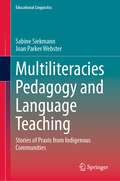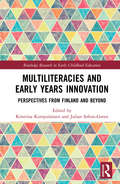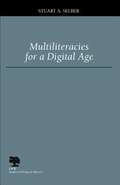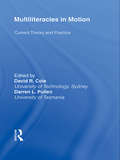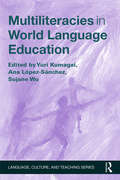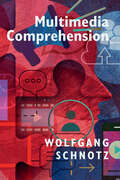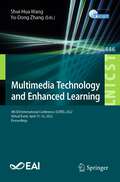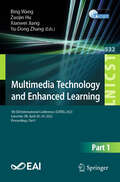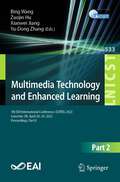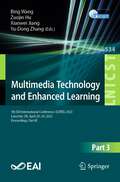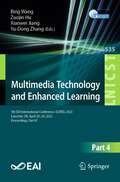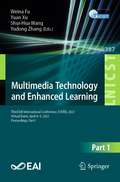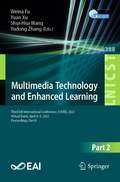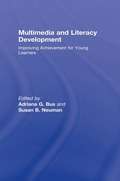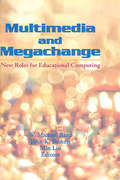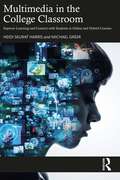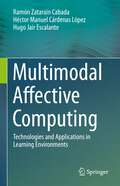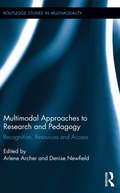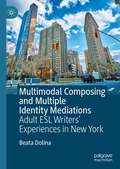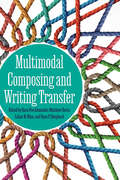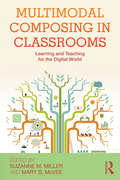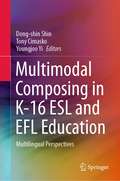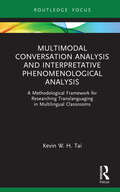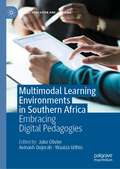- Table View
- List View
Multiliteracies Pedagogy and Language Teaching: Stories of Praxis from Indigenous Communities (Educational Linguistics #60)
by Sabine Siekmann Joan Parker WebsterThis volume offers an approach to language and literacy instruction that brings together theoretical concepts of multiliteracies and second language acquisition. This approach is illustrated through examples of innovative teacher-generated action research conducted in Indigenous and English, dual language and immersion classrooms, all situated in the context of language and cultural maintenance and revitalization. These examples of praxis help to bridge the gap between theory and practice in Indigenous language and literacy teaching. The volume draws on critical theories of praxis and the concept of multiliteracies and multimodalities, with specific attention to the design cycle as a way to conceptualize and engage in praxis through research and pedagogy. The authors trace teacher trajectories relating to (language) teaching and their positionalities in language revitalization and maintenance efforts by using a participatory teacher action research approach. The final chapter brings together Indigenous and western onto-epistemological and methodological perspectives in a conversation among two western and an Indigenous scholar, who have been working together with the teacher-researchers whose stories are presented in this volume. This volume is of interest to scholars, graduate students, educational practitioners and educational leaders interested in multiliteracies, multimodalities, teacher action research, and Indigenous pedagogies.
Multiliteracies and Early Years Innovation: Perspectives from Finland and Beyond (Routledge Research in Early Childhood Education)
by Julian Sefton-Green Kristiina KumpulainenMultiliteracies and Early Years Innovation: Perspectives from Finland and Beyond brings together internationally renowned scholars to investigate and reflect upon the significance of introducing multiliteracies in the education of children (0–8 years old) and the challenge of enhancing professional development opportunities of early years practitioners. The book brings together curriculum innovation and reform and the changing media ecology of young children's learning lives in a single volume. It provides insights into Finnish early years education in terms of policy, practice, and research with a specific focus on the enhancement of children’s multiliteracies. Case studies from around the world explore co-developing practices between researchers and teachers, the development of communities and the ways in which different classroom interventions draw on new kinds of teacher knowledge. This book will appeal to academics, researchers, and postgraduate students with an interest in early years education, literacy education, the sociology of digital culture, school reform, teacher education, and comparative education.
Multiliteracies for a Digital Age
by Stuart A. SelberThis is a guide for composition teachers to develop effective, full-scale computer literacy programs that are also professionally responsible by emphasizing different kinds of literacies and proposing methods for helping students move among them in strategic ways.
Multiliteracies in Motion: Current Theory and Practice
by David R. Cole Darren Lee PullenThe realities of new technological and social conditions since the 1990s demand a new approach to literacy teaching. Looking onward from the original statement of aims of the multiliteracies movement in 1996, this volume brings together top-quality scholarship and research that has embraced the notion and features new contributions by many of the originators of this approach to literacy. Drawing on large research projects and empirical evidence, the authors explore practical and educational issues that relate to multiliteracies, such as assessment, pedagogy and curriculum. The viewpoint taken is that multiliteracies is a complementary socio-cultural approach to the new literacies that includes pedagogy and learning. The differences are addressed from a multiliteracies perspective – one that does not discount or undermine the new literacies, but shows new ways in which they are complementary. Computers and the internet are transforming the way we work and communicate and the very notion of literacy itself. This volume offers frontline information and a vital update for those wishing to understand the evolution of multiliteracies and the current state of literacy theory in relation to it.
Multiliteracies in World Language Education (Language, Culture, and Teaching Series)
by Yuri Kumagai Ana López-Sánchez Sujane WuPutting a multiliteracies framework at the center of the world language curriculum, this volume brings together college-level curricular innovations and classroom projects that address differences in meaning and worldviews expressed in learners’ primary and target languages. Offering a rich understanding of languages, genres, and modalities as socioculturally situated semiotic systems, it advocates an effective pedagogy for developing learners’ abilities to operate between languages. Chapters showcase curricula that draw on a multiliteracies framework and present various classroom projects that develop aspects of multiliteracies for language learners. A discussion of the theoretical background and historical development of the pedagogy of multiliteracies and its relevance to the field of world language education positions this book within the broader literature on foreign language education. As developments in globalization, accountability, and austerity challenge contemporary academia and the current structure of world language programs, this book shows how the implementation of a multiliteracies-based approach brings coherence to language programs, and how the framework can help to accomplish the goals of higher education in general and of language education in particular.
Multimedia Comprehension
by Wolfgang SchnotzMultimedia messages use combinations of texts, pictures, maps, and graphs as tools for communication. This book provides a synthesis of theory and research about how people comprehend multimedia. It adopts the perspectives of cognitive psychology, semiotics, anthropology, linguistics, education, and art. Its central idea is that information displays can be categorized into two different but complementary forms of representations, which service different purposes in human cognition and communication. Specific interaction between these representations enhances comprehension, thinking, and problem solving, as illustrated by numerous examples. Multimedia Comprehension is written for a broad audience with no special prior knowledge. It is of interest to everyone trying to understand how people comprehend multimedia, from scholars and students in psychology, communication, and education, to web- and interface-designers and instructors.
Multimedia Technology and Enhanced Learning: 4th EAI International Conference, ICMTEL 2022, Virtual Event, April 15-16, 2022, Proceedings (Lecture Notes of the Institute for Computer Sciences, Social Informatics and Telecommunications Engineering #446)
by Shui-Hua Wang Yu-Dong ZhangThis proceedings, ICMTEL 2022, constitutes the refereed proceedings of the 4th International Conference on Multimedia Technology and Enhanced Learning, ICMTEL 2022, held in April 2022. Due to the COVID-19 pandemic the conference was held virtually.The 59 revised full papers have been selected from 188 submissions. They were organized in topical sections as follows: internet of things and communication; education and enterprise; machine learning; big data and signal processing; workshop of data fusion for positioning and navigation; and workshop of intelligent systems and control.
Multimedia Technology and Enhanced Learning: 5th EAI International Conference, ICMTEL 2023, Leicester, UK, April 28-29, 2023, Proceedings, Part I (Lecture Notes of the Institute for Computer Sciences, Social Informatics and Telecommunications Engineering #532)
by Yu-Dong Zhang Bing Wang Zuojin Hu Xianwei JiangThe four-volume set LNICST 532, 533, 534 and 535 constitutes the refereed proceedings of the 5th EAI International Conference on Multimedia Technology and Enhanced Learning, ICMTEL 2023, held in Leicester, UK, during April 28-29, 2023.The 121 papers presented in the proceedings set were carefully reviewed and selected from 285 submissions. They were organized in topical sections as follows: AI-based education and learning systems; medical and healthcare; computer vision and image processing; data mining and machine learning; workshop 1: AI-based data processing, intelligent control and their applications; workshop 2: intelligent application in education; and workshop 3: the control and data fusion for intelligent systems.
Multimedia Technology and Enhanced Learning: 5th EAI International Conference, ICMTEL 2023, Leicester, UK, April 28-29, 2023, Proceedings, Part II (Lecture Notes of the Institute for Computer Sciences, Social Informatics and Telecommunications Engineering #533)
by Yu-Dong Zhang Bing Wang Zuojin Hu Xianwei JiangThe four-volume set LNICST 532, 533, 534 and 535 constitutes the refereed proceedings of the 5th EAI International Conference on Multimedia Technology and Enhanced Learning, ICMTEL 2023, held in Leicester, UK, during April 28-29, 2023.The 121 papers presented in the proceedings set were carefully reviewed and selected from 285 submissions. They were organized in topical sections as follows: AI-based education and learning systems; medical and healthcare; computer vision and image processing; data mining and machine learning; workshop 1: AI-based data processing, intelligent control and their applications; workshop 2: intelligent application in education; and workshop 3: the control and data fusion for intelligent systems.
Multimedia Technology and Enhanced Learning: 5th EAI International Conference, ICMTEL 2023, Leicester, UK, April 28-29, 2023, Proceedings, Part III (Lecture Notes of the Institute for Computer Sciences, Social Informatics and Telecommunications Engineering #534)
by Yu-Dong Zhang Bing Wang Zuojin Hu Xianwei JiangThe four-volume set LNICST 532, 533, 534 and 535 constitutes the refereed proceedings of the 5th EAI International Conference on Multimedia Technology and Enhanced Learning, ICMTEL 2023, held in Leicester, UK, during April 28-29, 2023.The 121 papers presented in the proceedings set were carefully reviewed and selected from 285 submissions. They were organized in topical sections as follows: AI-based education and learning systems; medical and healthcare; computer vision and image processing; data mining and machine learning; workshop 1: AI-based data processing, intelligent control and their applications; workshop 2: intelligent application in education; and workshop 3: the control and data fusion for intelligent systems.
Multimedia Technology and Enhanced Learning: 5th EAI International Conference, ICMTEL 2023, Leicester, UK, April 28-29, 2023, Proceedings, Part IV (Lecture Notes of the Institute for Computer Sciences, Social Informatics and Telecommunications Engineering #535)
by Yu-Dong Zhang Bing Wang Zuojin Hu Xianwei JiangThe four-volume set LNICST 532, 533, 534 and 535 constitutes the refereed proceedings of the 5th EAI International Conference on Multimedia Technology and Enhanced Learning, ICMTEL 2023, held in Leicester, UK, during April 28-29, 2023.The 121 papers presented in the proceedings set were carefully reviewed and selected from 285 submissions. They were organized in topical sections as follows: AI-based education and learning systems; medical and healthcare; computer vision and image processing; data mining and machine learning; workshop 1: AI-based data processing, intelligent control and their applications; workshop 2: intelligent application in education; and workshop 3: the control and data fusion for intelligent systems.
Multimedia Technology and Enhanced Learning: Third EAI International Conference, ICMTEL 2021, Virtual Event, April 8–9, 2021, Proceedings, Part I (Lecture Notes of the Institute for Computer Sciences, Social Informatics and Telecommunications Engineering #387)
by Yuan Xu Shui-Hua Wang Weina Fu Yudong ZhangThis two-volume book constitutes the refereed proceedings of the 3rd International Conference on Multimedia Technology and Enhanced Learning, ICMTEL 2021, held in April 2021. Due to the COVID-19 pandemic the conference was held virtually. The 97 revised full papers have been selected from 208 submissions. They describe new learning technologies which range from smart school, smart class and smart learning at home and which have been developed from new technologies such as machine learning, multimedia and Internet of Things.
Multimedia Technology and Enhanced Learning: Third EAI International Conference, ICMTEL 2021, Virtual Event, April 8–9, 2021, Proceedings, Part II (Lecture Notes of the Institute for Computer Sciences, Social Informatics and Telecommunications Engineering #388)
by Yuan Xu Shui-Hua Wang Weina Fu Yudong ZhangThis two-volume book constitutes the refereed proceedings of the 3rd International Conference on Multimedia Technology and Enhanced Learning, ICMTEL 2021, held in April 2021. Due to the COVID-19 pandemic the conference was held virtually. The 97 revised full papers have been selected from 208 submissions. They describe new learning technologies which range from smart school, smart class and smart learning at home and which have been developed from new technologies such as machine learning, multimedia and Internet of Things.
Multimedia and Literacy Development: Improving Achievement for Young Learners
by Susan B. Neuman Adriana G. BusRepresenting the state of the art in multimedia applications and their promise for enhancing early literacy development, this volume broadens the field of reading research by looking beyond print-only experiences to young readers’ encounters with multimedia stories on the Internet and DVD. Multimedia storybooks include, in addition to static pictures and written text, features such as oral text, animations, sounds, zooms, and scaffolds designed to help convey meaning. These features are changing how young children read text, and also provide technology-based scaffolds for helping struggling readers. Multimedia and Literacy Development reports experimental research and practices with multimedia stories indicating that new dimensions of media contribute to young children’s ability to understand stories and to read texts independently. This is the first synthesis of evidence-based research in this field. Four key themes are highlighted: Understanding the multimedia environment for learning Designing multimedia applications for learning New approaches to storybook reading Multimedia applications in classroom instruction. Written in jargon-free language for an international audience of students in university courses on literacy and information technology, researchers, policymakers, program developers, and media specialists, this volume is essential reading for all professionals interested in early literacy and early interventions.
Multimedia and Megachange: New Roles for Educational Computing
by W Michael Reed John K BurtonThe use of multimedia strikes at the very heart of traditional teaching and learning methods, and is changing the way educators think about the whole process of teaching and learning. Multimedia and Megachange spurs ideas for the use of interactive technology to revolutionize teaching and learning. It describes and analyzes issues and trends that are currently setting a research and development agenda for educators.Contributors to this volume explore all fronts on which computer technology are changing the educational process:concept and theoryresearchapplicationdesignMultimedia and Megachange opens up the exciting world of how technology is dramatically changing how teachers teach and students learn. It also highlights spin-off changes for classroom management, greater sources of information, and improved evaluation and grading techniques.
Multimedia in the College Classroom: Improve Learning and Connect with Students in Online and Hybrid Courses
by Heidi Skurat Harris Michael GreerThis practical guide to multimedia in online college instruction provides easy-to-follow instructions for designing multimedia assignments that maximize student learning while reducing cognitive load.This book presents the learning process as a complex, multidimensional experience that includes texts as well as auditory and visual elements. Each chapter includes research-based activities to develop instructors’ multimedia skills. The book leverages cutting edge cognitive research to improve accessibility and design, while also providing practical asynchronous and synchronous activities that engage learners.Multimedia in the College Classroom is the ideal resource for any higher education instructor, administrator, or leader who wishes to learn about, reflect on, and implement research-based learning strategies through the targeted use of multimedia.
Multimodal Affective Computing: Technologies and Applications in Learning Environments
by Hugo Jair Escalante Ramón Zatarain Cabada Héctor Manuel LópezThis book explores AI methodologies for the implementation of affective states in intelligent learning environments. Divided into four parts, Multimodal Affective Computing: Technologies and Applications in Learning Environments begins with an overview of Affective Computing and Intelligent Learning Environments, from their fundamentals and essential theoretical support up to their fusion and some successful practical applications. The basic concepts of Affective Computing, Machine Learning, and Pattern Recognition in Affective Computing, and Affective Learning Environments are presented in a comprehensive and easy-to-read manner. In the second part, a review on the emerging field of Sentiment Analysis for Learning Environments is introduced, including a systematic descriptive tour through topics such as building resources for sentiment detection, methods for data representation, designing and testing the classification models, and model integration into a learning system. The methodologies corresponding to Multimodal Recognition of Learning-Oriented Emotions are presented in the third part of the book, where topics such as building resources for emotion detection, methods for data representation, multimodal recognition systems, and multimodal emotion recognition in learning environments are presented. The fourth and last part of the book is devoted to a wide application field of the combination of methodologies, such as Automatic Personality Recognition, dealing with issues such as building resources for personality recognition, methods for data representation, personality recognition models, and multimodal personality recognition for affective computing. This book can be very useful not only for beginners who are interested in affective computing and intelligent learning environments, but also for advanced and experts in the practice and developments of the field. It complies an end-to-end treatment on these subjects, especially with educational applications, making it easy for researchers and students to get on track with fundamentals, established methodologies, conventional evaluation protocols, and the latest progress on these subjects.
Multimodal Approaches to Research and Pedagogy: Recognition, Resources, and Access (Routledge Studies in Multimodality)
by Denise Newfield Arlene ArcherThis book brings together social semiotics, cultural studies, multiliteracies, and other approaches in order to theorize very different learning environments, giving visibility to the modal effect in a range of disciplines. It highlights the ideological nature of discursive practices, examines questions of access, and argues for transformation of these practices, with a constant eye on issues of social justice and equity. Contributors argue that we can harness learners’ representational resources through making these resources visible, and creating less regulated spaces in the curriculum in which they can be used. Examples from primary education through to adult continuing education are used throughout the text.
Multimodal Composing and Multiple Identity Mediations: Adult ESL Writers' Experiences in New York
by Beata DolinaThis book examines the experiences of adult ESL (English as a Second Language) learners in New York, paying particular attention to the relationship between their professional identities and multimodal composing practices in English classroom. The author uses an (auto-)ethnographic framework to investigate how previously-constructed identities of a professional nature aided the students in the design of multimodal texts including photographs and written material in English. This small-scale study is contextualised in relation to current research in the fields of multimodality, identity construction and teaching methodology, and the author also draws on Kress' theory of visual semiotics. Finally, the book provides detailed descriptions and suggestions for multimodal lessons which could be delivered in ESL classrooms in other settings, including multimodal roleplays, theatre games, and model discussion questions and answers. This book will be of interest to ESL/EFL and TESOL researchers and practitioners, as well as pre-service teachers and MA TESOL students.
Multimodal Composing and Writing Transfer
by Matthew Davis Lilian W. Mina Kara Poe AlexanderMultimodal Composing and Writing Transfer explores transfer across various contexts of multimodal composing, extending the early conversations connecting multimodality to writing. Contributors address how writing transfer theories intersect with multimodal composing and present methods for facilitating transfer across modes and media, offering insight into how writers can learn to compose when they encounter familiar modes in new contexts. Over the past two decades the concepts of multimodal composing and writing transfer have grown and reshaped the nature of writing studies, but rarely have the ways in which these areas overlap been studied. This collection shows how this shift in writing studies has been mutually informative, covering a wider range of contexts for multimodality and writing transfer than just in first-year composition courses. It places composition teaching practices and multimodal research in conversation with learning transfer theory to provide an in-depth examination of how they influence one another. Multimodal Composing and Writing Transfer develops these intersections to connect multimodal composition and writing practices across a wide array of fields and contexts. Scholars across disciplines, postsecondary writing teachers, writing program administrators, writing center directors, and graduate students will find this collection indispensable.
Multimodal Composing in Classrooms: Learning and Teaching for the Digital World
by Suzanne M. Miller Mary B. McVeeTaking a close look at multimodal composing as an essential new literacy in schools, this volume draws from contextualized case studies across educational contexts to provide detailed portraits of teachers and students at work in classrooms. Authors elaborate key issues in transforming classrooms with student multimodal composing, including changes in teachers, teaching, and learning. Six action principles for teaching for embodied learning through multimodal composing are presented and explained. The rich illustrations of practice encourage both discussion of practical challenges and dilemmas and conceptualization beyond the specific cases. Historically, issues in New Literacy Studies, multimodality, new literacies, and multiliteracies have primarily been addressed theoretically, promoting a shift in educators’ thinking about what constitutes literacy teaching and learning in a world no longer bounded by print text only. Such theory is necessary (and beneficial for re-thinking practices). What Multimodal Composing in Classrooms contributes to this scholarship are the voices of teachers and students talking about changing practices in real classrooms.
Multimodal Composing in K-16 ESL and EFL Education: Multilingual Perspectives
by Dong-Shin Shin Tony Cimasko Youngjoo YiThis book offers a comprehensive view of multimodal composing and literacies in multilingual contexts for ESL and EFL education in United States of America and globally. It illustrates the current state of multimodal composing and literacies, with an emphasis on English learners' language and literacy development. The book addresses issues concerning multilinguals' multimodal composing and reflects on what the nexus of multimodality, writing development, and multilingual education entails for future research. It provides research-driven and practice-oriented perspectives of multilinguals' multimodal composing, drawing on empirical data from classroom contexts to elucidate aspects of multimodal composing from a range of theoretical perspectives such as multiliteracies, systemic functional linguistics, and social semiotics. This book bridges the gap among theory, research, and practice in TESOL and applied linguistics. It serves as a useful resource for scholars and teacher educators in the areas of applied linguistics, second language studies, TESOL, and language education.
Multimodal Conversation Analysis and Interpretative Phenomenological Analysis: A Methodological Framework for Researching Translanguaging in Multilingual Classrooms (Qualitative and Visual Methodologies in Educational Research)
by Kevin W. TaiThis book presents the methodological framework of combining Multimodal Conversation Analysis (MCA) with Interpretative Phenomenological Analysis (IPA) to interpretively analyse translanguaging practices in educational contexts. Beginning with an overview of the three uses of translanguaging—translanguaging as a theory of language, as a pedagogical practice, and as an analytical perspective—the book goes on to critically examine the different methodological approaches for analysing translanguaging practices in multilingual classroom interactions. It explains how MCA and IPA are useful methodologies for understanding how and why translanguaging practices are constructed by participants in the classroom and discusses types of data collected and data collection procedures. The author, Kevin W. H. Tai, shows how combining these approaches enables researchers to study how translanguaging practices are constructed in multilingual classrooms and how teachers make sense of their own translanguaging practices at particular moments of classroom interaction. This detailed and concise guide is indispensable for students, practitioners, policymakers, and researchers from across the globe, particularly those working in the fields of applied linguistics and language education.
Multimodal Funds of Knowledge in Literacy: Countering Deficit Narratives of Diverse Families
by Sally Brown Rong ZhangApplying an asset-based approach, Multimodal Funds of Knowledge in Literacy prepares educators to teach and support diverse students and their families as they negotiate multimodal aspects of literacy learning. Framed by sociocultural theory, multiliteracies, multimodality, and posthumanism, the text combats deficit narratives by providing concrete alternatives that push educators to rethink their practices and support students’ and families’ cultural and linguistic strengths.Chapters include case studies, vignettes, prompts, and learning samples that will leave readers with valuable insights and new understandings of multimodal funds of knowledge. Comprehensive and instructive, this book is a key text in literacy education, family literacy, and community engagement.
Multimodal Learning Environments in Southern Africa: Embracing Digital Pedagogies (Digital Education and Learning)
by Jako Olivier Avinash Oojorah Waaiza UdhinThis book offers an important overview of technology-enhanced education in Southern Africa. With original research from Malawi, Mauritius, Namibia, South Africa, Tanzania and Zimbabwe, this book provides in-depth scientific scholarship focused on the dynamic multimodal learning environments in the region. With the onset of the COVID-19 pandemic, the world has largely had to adjust to remotelearning. Hence, the editors and contributors pull together important research on digital pedagogies and assessment to demonstrate how technology can be effectively employed for multimodal learning environments within the Southern African context. This book will be of interest and value to scholars of digital education, multimodal learning and education within Southern Africa and beyond.
